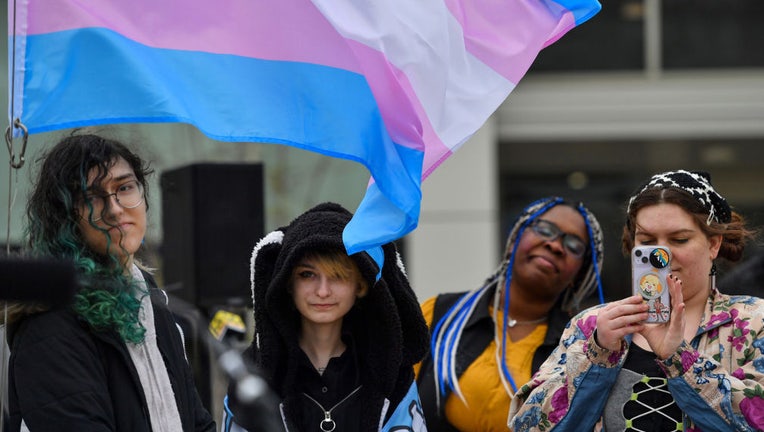Kansas passes transgender bathroom bill; Arkansas approves own version of legislation

Members of the Gender Sexuality Alliance stand under the Transgender flag at a ceremony and flag raising for the Transgender Day of Visibility on March 31, 2023. (Aimee Dilger/SOPA Images/LightRocket via Getty Images)
TOPEKA, Kan. - A Kansas bill to impose some of the nation's broadest bathroom restrictions and ban transgender people from changing the name or gender on their driver's licenses cleared the Legislature by margins Tuesday that suggest backers could override the Democratic governor's expected veto.
The Kansas Senate voted 28-12 with one vote more than a two-thirds majority needed to overturn any veto, giving final passage to an earlier House-passed version and sending it to Gov. Laura Kelly. Both chambers have Republican supermajorities.
The measure deals with bathrooms, locker rooms and other facilities, and defines "sex" as "either male or female, at birth," a move LGBTQ+-rights advocates said would legally erase transgender people and deny recognition to non-binary, gender fluid and gender non-conforming people.
RELATED: States target transgender health care in first bills of 2023
The final vote came less than two hours after Arkansas lawmakers sent Republican Gov. Sarah Huckabee Sanders a bathroom bill after scaling it back following complaints it would have criminalized transgender people for simply using a public restroom.
The Arkansas bill would allow transgender people to be charged with a misdemeanor for using bathrooms or changing rooms associated with their identities if cisgendered minors are present, but only if they enter it "for the purpose of arousing or gratifying a sexual desire."
Both state's measures are among several hundred aimed at rolling back LGBTQ rights pursued by Republicans this year across the United States. The wave of legislation has angered and vexed LGBTQ-rights activists, trangender people and parents of transgender children.
RELATED: Iowa governor signs gender-affirming care ban, bathroom law
"I am what they are scared of," Ian Benalcazar, a 13-year-old northeastern Kansas transgender boy said during a recent LGBTQ-rights rally outside the Statehouse. "I am a human being and I deserve to be treated as such, and I deserve to be happy."
Arkansas is among seven states that have banned transgender students from using school bathrooms and locker rooms associated with their gender identities, its law taking effect this summer.
However, the Kansas measure also covers prisons, jails, rape crisis centers, domestic violence shelters and other spaces "where biology, safety or privacy" prompt separate facilities for men and women.
The Kansas bill defines male and female based on a person’s physical anatomy at birth.
The measure now headed to Kelly would declare that legally, "sex" means "biological" sex, "either male or female, at birth." And it adds, "important governmental objectives of protecting the health, safety and privacy" justify separate spaces for men and women like bathrooms and locker rooms.
"This will protect women’s spaces currently reserved for women and and men’s spaces," said House Health Committee Chair Brenda Landwehr, a Wichita Republican who voted for the bill.
Supporters framed their measure as a proposed "Women's Bill of Rights," similar to measures introduced in Congress and at least five other states. It was based on language circulated by several national anti-trans groups.
Senate President Ty Masterson, a Wichita-area Republican, said lawmakers are trying to protect families amid what people see as a small but growing number of cases of transgender girls or women using facilities with cisgendered girls or women.
"People are starting to pay attention," Masterson said.
Kansas House members included provisions requiring accommodations for some intersex people born with chromosomes, genitalia, or reproductive organs not associated with typical definitions for males or females.
The House vote last month was 83-41, one vote shy of the two-thirds majority necessary to override any veto, but one conservative Republican likely to support the bill was absent.
Kelly vetoed a proposed ban on transgender athletes in girls' and women's sports this year for the third straight year. Republican lawmakers in Kansas also are pursuing a bill aimed at stopping gender-affirming care for minors, something at least 11 states have done.
The governor promised LGBTQ youth lobbying lawmakers last week that she would "protect your rights" and "veto any bill that aims to harm or discriminate against you."
In Arkansas, lawmakers initially considered a version of their bill that would have gone further than a 2016 North Carolina bathroom law, through the North Carolina law didn't have criminal penalties. The Arkansas measure allows someone to be charged with misdemeanor sexual indecency with a child.
The Republican-dominated state Senate approved the revised bill on a 29-4 vote without debate. The House approved it last week without any "no" votes.
Doctors say reproductive anatomy at birth doesn’t always align with strict definitions of sex and that binary views of sexual identity can miss biological nuances.
Carson Rapp, a Wichita, Kansas-area 15-year-old who identifies as bigender or embracing "both more masculine and more feminine traits," said expressing one's gender identity doesn't harm others.
"Why stop people from doing it if they’re just being themselves and having fun and expressing themselves?" Carson said during an LGBTQ-youth lobbying day.
LGBTQ-rights advocates say having a driver’s license or birth certificate confirm a transgender person’s identity is important by itself but also can prevent daily hassles or harassment.
The bill’s language would prevent transgender people from changing both driver's licenses and birth certificates, but Kansas is under a 2019 federal court order to allow birth certificate changes.
Carson's father, Will Rapp, the Kansas managing director for GLSEN, a group advocating for LGBTQ youth, said it's discouraging to see what he called "pretty awful" legislation.
"I would like to think that if they were to get to know these young people, that would change their hearts, and we will always have hope for that," he said.
DeMillo reported from Little Rock, Arkansas.

